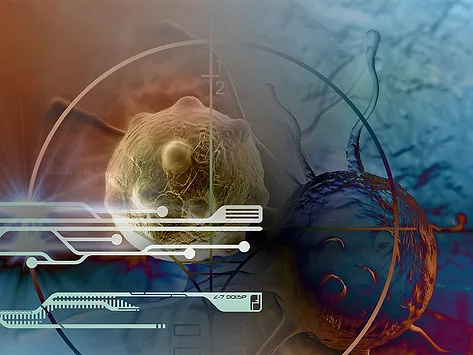
News
October 17, 2025
Nuphase Therapeutics patents new IL-17A/A homodimer and IL-17A/F heterodimer inhibitors
Nuphase Therapeutics (Shanghai) Co. Ltd. has disclosed compounds acting as interleukin-17A/A homodimer and IL-17A/F heterodimer inhibitors reported to be useful for the treatment of cancer, autoimmune and inflammatory diseases.
**Nuphase Therapeutics Patents New IL-17A/A Homodimer and IL-17A/F Heterodimer Inhibitors**
Shanghai-based Nuphase Therapeutics has announced the patenting of innovative compounds that could revolutionize the treatment of a range of debilitating diseases, including cancer, autoimmune disorders, and inflammatory conditions. These newly patented compounds function as inhibitors of interleukin-17A/A homodimers and interleukin-17A/F heterodimers, key players in the body's inflammatory response.
Interleukin-17A (IL-17A) is a powerful cytokine, a type of protein that acts as a messenger between cells, particularly within the immune system. While IL-17A plays a crucial role in defending the body against infections, its overproduction or dysregulation is heavily implicated in the development and progression of various diseases. IL-17A typically functions either as a homodimer, meaning it’s a pair of identical IL-17A molecules working together, or as a heterodimer, pairing with a related molecule called IL-17F. Both forms contribute to inflammation, but with potentially varying effects depending on the specific disease context.
Nuphase Therapeutics' breakthrough lies in developing compounds that can effectively block the activity of both the IL-17A/A homodimer and the IL-17A/F heterodimer. By inhibiting these inflammatory drivers, the compounds aim to dampen the excessive immune response that fuels diseases like rheumatoid arthritis, psoriasis, inflammatory bowel disease (IBD), and certain cancers.
The potential applications of these inhibitors are vast. In autoimmune diseases, the body mistakenly attacks its own tissues, leading to chronic inflammation and damage. By suppressing the IL-17A-mediated inflammatory pathways, these compounds could offer a new therapeutic avenue for managing symptoms and potentially slowing disease progression. Similarly, in inflammatory diseases like IBD, these inhibitors could help to reduce inflammation in the gut, alleviating symptoms such as abdominal pain, diarrhea, and rectal bleeding.
Furthermore, the role of IL-17A in cancer development is increasingly recognized. In some cancers, IL-17A can promote tumor growth, angiogenesis (the formation of new blood vessels that feed tumors), and metastasis (the spread of cancer to other parts of the body). By targeting IL-17A, Nuphase Therapeutics' inhibitors could potentially offer a novel approach to cancer therapy, either alone or in combination with
Shanghai-based Nuphase Therapeutics has announced the patenting of innovative compounds that could revolutionize the treatment of a range of debilitating diseases, including cancer, autoimmune disorders, and inflammatory conditions. These newly patented compounds function as inhibitors of interleukin-17A/A homodimers and interleukin-17A/F heterodimers, key players in the body's inflammatory response.
Interleukin-17A (IL-17A) is a powerful cytokine, a type of protein that acts as a messenger between cells, particularly within the immune system. While IL-17A plays a crucial role in defending the body against infections, its overproduction or dysregulation is heavily implicated in the development and progression of various diseases. IL-17A typically functions either as a homodimer, meaning it’s a pair of identical IL-17A molecules working together, or as a heterodimer, pairing with a related molecule called IL-17F. Both forms contribute to inflammation, but with potentially varying effects depending on the specific disease context.
Nuphase Therapeutics' breakthrough lies in developing compounds that can effectively block the activity of both the IL-17A/A homodimer and the IL-17A/F heterodimer. By inhibiting these inflammatory drivers, the compounds aim to dampen the excessive immune response that fuels diseases like rheumatoid arthritis, psoriasis, inflammatory bowel disease (IBD), and certain cancers.
The potential applications of these inhibitors are vast. In autoimmune diseases, the body mistakenly attacks its own tissues, leading to chronic inflammation and damage. By suppressing the IL-17A-mediated inflammatory pathways, these compounds could offer a new therapeutic avenue for managing symptoms and potentially slowing disease progression. Similarly, in inflammatory diseases like IBD, these inhibitors could help to reduce inflammation in the gut, alleviating symptoms such as abdominal pain, diarrhea, and rectal bleeding.
Furthermore, the role of IL-17A in cancer development is increasingly recognized. In some cancers, IL-17A can promote tumor growth, angiogenesis (the formation of new blood vessels that feed tumors), and metastasis (the spread of cancer to other parts of the body). By targeting IL-17A, Nuphase Therapeutics' inhibitors could potentially offer a novel approach to cancer therapy, either alone or in combination with
Category:
Technology